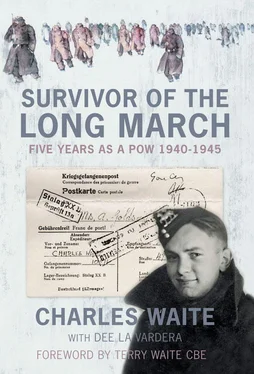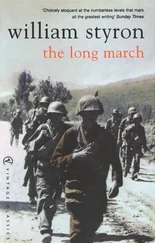It was very quiet most of the time except one night, I’d been in about three days and suddenly I was woken by loud footsteps down the corridor and this terrific racket of banging and shouting. It was the guards coming along kicking the cell doors and then calling out ‘ Bist du da? ’ – are you there? How stupid! Where else would you be? You had to answer ‘ Ja’ . Apparently there’d been an escape but not from the prison. After I came out I learned that it had been down below, where the prisoners in the main camp had built a series of tunnels.
We were supposed to get regular breaks, to go out every morning for half an hour to exercise and get a quick wash in the wooden trough in the yard. I went out twice. Guards came and kicked the doors, opened them and shouted ‘Heraus! Waschen’ – Out. Wash, and you grabbed your flannel and toothbrush and waited to be marched out to a small yard.
The other prisoners were a rough-looking lot but then this wasn’t a holiday camp and I didn’t know who they were or why they were there. You couldn’t tell what nationality they were from their uniforms, which were more bits and pieces of odd clothing. There were English, French and Serbs, I think. And I didn’t ask. I was very careful not to look up too much in case I caught someone’s eyes and spoke by mistake. I didn’t want the butt of a rifle between my shoulder blades. We took it in turns to wash our faces as best we could in the dirty water in the trough and then walk round and round the yard to stretch our legs and enjoy a tiny bit of sunshine on our faces.
Ten days isn’t very long really. I mean, I wasn’t being punished with hard labour or anything. That was what I was going back to. I wondered if the lads were thinking of me. Had they received any Red Cross parcels? Would they save some ciggies or jam for me? Were they right now boiling up some hot water to make a jelly from the rations? That would go down a treat right now.
Were there any letters waiting for me from Lily or sister, Winnie, and brother-in-law, Bert? What about my arch enemy, the guard, Jan, what was he up to? I felt sorry for him actually. He was a prisoner too of the same invading German Army. He would rather be at home, going to work at a local factory every day, having a laugh with his mates and going home to his wife and kiddies every night, and a meal of pork and dumplings laid out ready on the table, finished off with a tot of schnapps.
When I was eventually released, a guard came and fetched me and escorted me outside into the main camp. It felt good not being cooped up like I was, to look up and see a blue sky and breathe nice fresh air. To watch other people walking around outside. I might still be in a prisoner of war camp surrounded by high walls and barbed wire and watch towers but it was a relief to be out there with other men. We came down the steps and out through the gate and this chap was waiting, another English officer, and a prisoner of war, obviously.
‘Right, now then. You’re Private Charles Waite. Correct? 10511, your number?’
‘Yes, that’s right, sir.’
‘Before we go any further, do you want to go back where you came from?’
‘Yes, I do, sir.’
‘Then, stay away from that main gate.’ He pointed towards it. ‘Because that’s the town there.’
Funny that, if you stood in the right place you could see ordinary townsfolk passing by in the square. People free to go about their everyday business going to work and then home again.
‘If they want somebody for work and you’re standing there, they’ll grab you and then that’ll be it. Probably stay there. And you won’t see your mates again back at your place.’ He was like a school teacher telling a naughty pupil off. ‘You wouldn’t want that would you?’
I shook my head, ‘No, I wouldn’t.’ I thought of Jimmy and Laurie, Sid and Hebby waiting for me to return. Jack and Bill and all the others.
‘Because you’ll always be there under their thumb, ready to go out to do their work, whatever it is. Never go near that corner up there. That wire’s electrified. Keep away. Now you want something to eat I bet?’
‘Yes, please. I’ve got some biscuits in a locker somewhere.’ That’s good, I thought. I’ll get them back after all. I was starving.
‘Forget the biscuits,’ he said, ‘You can take them back with you. We’ve put you in here.’ He took me across the open square where a few prisoners were exercising and standing around smoking. There were rows of single-storey wooden huts and we went into one, turning into a small side room where there was a table, a couple of chairs and a single iron bed. Light was streaming in even though the panes of glass in the windows were greasy and dirty. It looked cosy and you could feel at home there but then I thought, I couldn’t stay there, not have lived there permanently. I wouldn’t have liked that, locked up behind those barbed wire and electric fences, along with the thousands of other men.
I was better off outside in the open, even if the work was hard. Work took your mind off what was going on or might happen. Yes, we saw terrible things happen which reminded us that war was never far away and that this what our men were fighting to stop. But we could get away from it, at least in our minds, when we were working.
There was nature all around us and we watched the seasons change on the farms. We walked out into vast, flat, open countryside, into those huge expanses of fields and pine forests. On the way we passed through hamlets and villages, with their stone built cottages and brick farm buildings. We heard church bells ring or horses hooves on cobbles. We had occasional glimpses of normal everyday life: women hanging out washing and children running around a yard. We had a different sort of freedom in my camp, I realised now. We didn’t have guards breathing down our necks all the time when we were working. And we knew how to get out at night, if we wanted to, as long as we didn’t do it too often. It didn’t look as though you could ever get outside a camp like this.
‘Would you like a shower first?’
‘That’ll be nice.’ I hadn’t had a proper wash for weeks before I went in. I was taken to a shower block which was a brick building with a row of cold water showers. Running water. Heaven, not having to share somebody else’s filthy water. When I came back there was a meal waiting for me. On a battered tin plate was a fried egg sandwich, oozing fat and the yolk already running out from between two slices of bread. ‘Where did you get this from?’ I asked.
‘Never you mind,’ he said as I tucked in. I picked up the sandwich and crammed it into my mouth, nearly choking with excitement and hunger. I licked my fingers (and the plate) to make sure every last bit had gone. That egg tasted so good. The last one I’d had must have been several months before, probably one that Jimmy had sneaked into the camp.
I found out afterwards that the officer was on the escape committee and that was why he knew so much about me and wasn’t going to have any nonsense from me. He didn’t want any trouble which could draw attention to what had been going on underground with their escape tunnels. To think that I could well have been sitting right on top of one of them; with men burrowing beneath my cell floor while I was sitting there twiddling my thumbs, dreaming of a bowl of mutton stew and dumplings.
It was lucky in a way that I got punished for my ‘Insubordination’ because it gave me the chance to see what was going on elsewhere and meet these other fellows in the camp. I stayed the night, bunking up with some of the lads and we had a laugh and swapped stories. It was good to hear a bit of news about what was happening in the war. You felt so cut off and not part of anything connected to what we had been called up for back in October 1939. Obviously they had access to a radio from the things they were telling me about this invasion and that attack. I learned more about what was happening to the Poles and Jews and their families and heard about what was happening in the concentration camps. I thought about Stutthof, the place not far from us.
Читать дальше




![Джеффри Арчер - The Short, the Long and the Tall [С иллюстрациями]](/books/388600/dzheffri-archer-the-short-the-long-and-the-tall-s-thumb.webp)







